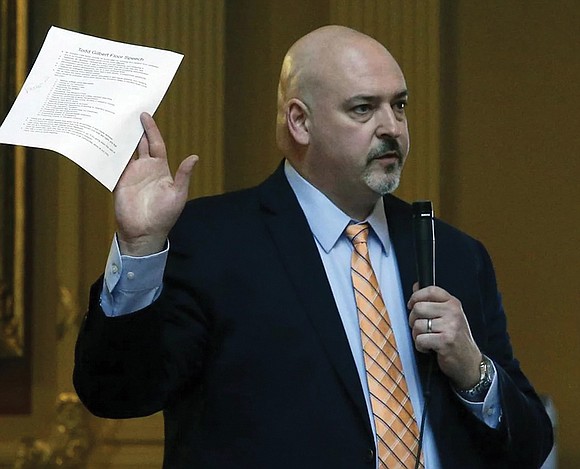House Republicans kill two historic resolutions
Jeremy M. Lazarus | 2/23/2023, 6 p.m.
Two resolutions expressing profound regret for past wrongs to Black people in Virginia have been killed in the Republican-dominated House of Delegates.
The legislature’s top Republican, House Speaker C. Todd Gilbert of rural Shenandoah County, led the effort to kill the Senate-authored apologies in the powerful House Rules Committee.
Before the 4-1 partisan vote to kill the two resolutions, Speaker Gilbert told the members of the Amendments Subcommittee that there were so many wrongs that had been committed in the past, there was no need to waste time apologizing for any of them.
The resolutions that passed the unanimous support from a closely divided Senate unanimously apologized for the use of Black bodies for medical purposes without the consent of the individuals or their families and for denying untold thousands of Black veterans of World War II the benefits of the G.I. Bill.
Fairfax Democratic state Sen. Jennifer B. Boysko introduced the resolution apologizing for the “unethical use of Black bodies” at the Medical College of Virginia and other medical institutions in the state.
The apology recalled the theft of Black bodies from graves in the 19th century that MCV as well as other public and private medical schools used for instruction in anatomy and surgery, and also cited MCV’s unauthorized use of a Black man’s heart for the world’s first human-to-human transplant in 1968.
“Given the chance to apologize for the theft of a Black heart, House Republicans declined,” wrote a frustrated attorney Phillip E. Thompson, a former NAACP president in Loudoun County who lobbied for the measure and helped craft the language.
The second resolution, which Portsmouth Democratic state Sen. L. Louise Lucas spearheaded, sought to make amends for the state’s active efforts to prevent Black veterans from gaining benefits from the G.I. bill, including admission to Virginia colleges and universities and low-interest loans to buy homes and start businesses.
The impacts of the efforts of Virginia and other states to deny Black veterans “from receiving a wide range of social benefits persists today (in the) longstanding educational, economic and housing inequality” that remains unaddressed in the decades since the war ended in 1945.








